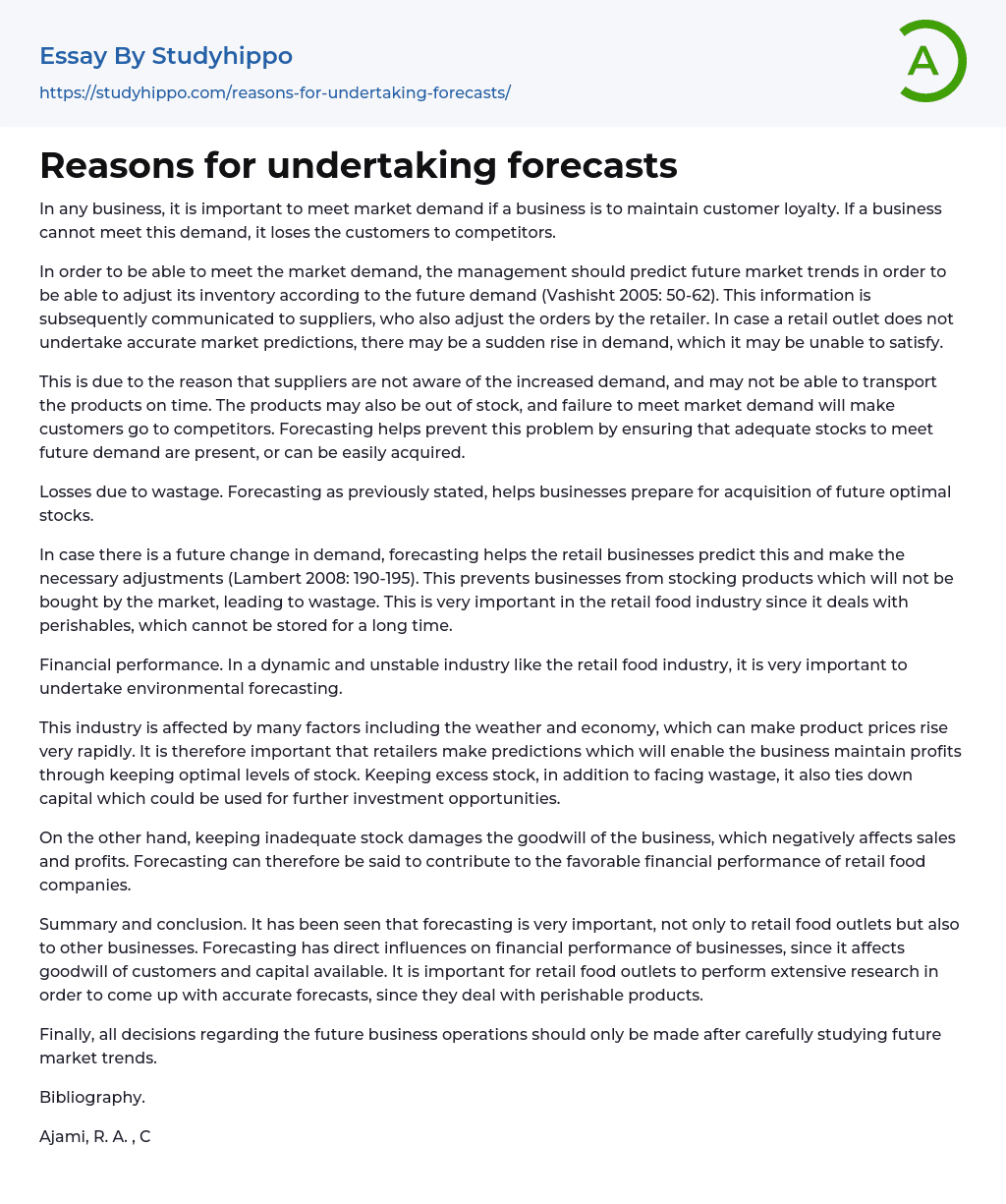Meeting market demand is crucial for any business to maintain customer loyalty and prevent losing customers to competitors. To achieve this, management must predict future market trends and adjust inventory accordingly to meet future demand. This information is communicated to suppliers who also adjust orders. Inaccurate market predictions can lead to sudden increases in demand that the business may be unable to satisfy due to suppliers not being aware of the increased demand or unable to transport products on time. This can result in loss of customers and increased competition. Forecasting helps prevent these problems by ensuring adequate stocks are present to meet future demand, preventing wastage and allowing businesses to make necessary adjustments. Additionally, forecasting enables businesses to avoid stocking products that will not be bought by the market, ultimately reducing wastage.In the retail food industry, forecasting is
...crucial due to dealing with perishable goods that have a limited shelf life. Financial performance is greatly impacted by external factors, such as the weather and economy, leading to rapid price increases that can influence stock levels. Accurate forecasting enables businesses to maintain profits by keeping optimal stock levels, preventing excess stock leading to waste and tying up capital. Inadequate stock levels harm a business's reputation, negatively impacting sales and profits. Therefore, forecasting contributes to positive financial performance in the retail food industry. It is essential that extensive research is conducted by retail food outlets to generate accurate forecasts due to dealing with perishable products. In summary, forecasting has a direct influence on the financial performance of businesses and is vital across industries, including retail food.In order to make informed decisions about future business operations, i
is imperative to carefully study and analyze future market trends. This information can be found in various sources, including the books "International Business: Theory and Practice" by R.A. Ajami, K. Cool, G. J. Goddard, and D. Khambata, "Scoring Points: How Tesco Continues to Win Customer Loyalty" by C. Humby, T. Hunt, and T. Phillips, "Supply Chain Management: Processes, Partnerships, Performance" by D.M. Lambert, and "Practical Approach to Marketing Management" by K. Vashisht.
- John Locke essays
- 9/11 essays
- A Good Teacher essays
- A Healthy Diet essays
- A Modest Proposal essays
- A&P essays
- Academic Achievement essays
- Achievement essays
- Achieving goals essays
- Admission essays
- Advantages And Disadvantages Of Internet essays
- Alcoholic drinks essays
- Ammonia essays
- Analytical essays
- Ancient Olympic Games essays
- APA essays
- Arabian Peninsula essays
- Argument essays
- Argumentative essays
- Art essays
- Atlantic Ocean essays
- Auto-ethnography essays
- Autobiography essays
- Ballad essays
- Batman essays
- Binge Eating essays
- Black Power Movement essays
- Blogger essays
- Body Mass Index essays
- Book I Want a Wife essays
- Boycott essays
- Breastfeeding essays
- Bulimia Nervosa essays
- Business essays
- Business Process essays
- Canterbury essays
- Carbonate essays
- Catalina de Erauso essays
- Cause and Effect essays
- Cesar Chavez essays
- Character Analysis essays
- Chemical Compound essays
- Chemical Element essays
- Chemical Substance essays
- Cherokee essays
- Cherry essays
- Childhood Obesity essays
- Chlorine essays
- Classification essays
- Cognitive Science essays




